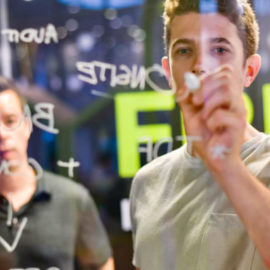
Why do certain stores make you want to linger and explore? What makes some retail spaces successful at converting browsers into buyers?
In his book Why We Buy, Paco Underhill reveals the science behind consumer behavior in the retail environment. His research uncovers how sensory experiences, emotional responses, and technological innovations shape the way people make purchasing decisions.
Keep reading to discover the psychology and strategic design elements that influence your shopping habits.
Understanding Consumer Behavior in Today’s Retail Environment
Consumer purchasing patterns are influenced by a combination of sensory experiences, emotions, and the impact of online environments. In today’s retail environment, understanding these factors is crucial for enhancing the shopping experience and boosting revenue. The process encompasses sensory perception, emotional responses, technological components, and various environmental and psychological subtleties.
Creating Sensory Shopping Experiences
Effective merchandising plays a central role in stimulating customer engagement with products. The sense of touch is often pivotal in shopping; numerous impulsive buys are made once you physically handle an item. Retail spaces should be arranged to promote direct engagement with products. Retail outlets like Apple, which promote hands-on experiences with their products, often see an increase in their revenue figures. Placing cost-effective items like ink-jet cartridges in locked displays can frustrate customers and potentially reduce sales.
Engaging Multiple Senses
Sensory cues strongly influence consumer purchasing patterns. The scent of freshly baked bread can sway your purchase decisions. Supermarkets often design enticing shopping environments by incorporating vivid colors and appealing scents of fruits and vegetables. Retailers like BookPeople and Old Navy create captivating spaces that stimulate the senses and establish themes that resonate with their target audience. Old Navy’s mesh tote bags offer not only utility for carrying purchases but also serve as marketable items.
A meticulously crafted product display can communicate quality through precise arrangement, tactile elements, and imagery suggesting far-off locations. By presenting products that engage all your senses, retailers can profoundly influence your perceptions and decisions.
Technology’s Impact on Retail
Digital marketplaces have transformed retail. Initially seen as complex and not user-friendly, platforms like Amazon have capitalized on physical stores’ constraints to offer a smooth and swift purchasing process. Consumer data allows for customized purchasing experiences, although it sometimes leads to errors, like incorrectly recognizing individuals who have collaborated on writing books.
Blending Physical and Digital Retail
Technology is fostering a smoother integration of in-store and online shopping. Internet-capable shelves demonstrate how technology continues to merge with commercial shopping. Retailers that effectively blend their brick-and-mortar locations with digital platforms and enhance the entire customer journey are positioned to thrive.
The Grand Bazaar has adapted to modern trends by creating an online platform, adding a new dimension to its historical commerce practices. Mobile phones as digital wallets may profoundly influence retailers in emerging markets. Web 2.0 has given you unprecedented access to information and multiple ways to interact with retailers.
By understanding and leveraging these sensory, emotional, and technological factors, shops can create retail environments that resonate with you across multiple dimensions.






